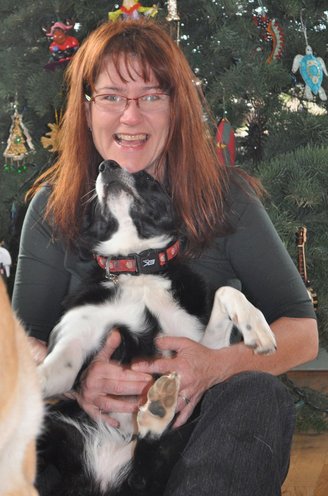
Patty
Siering was a biology professor at HSU, an extraordinary cook who
threw great parties, a founding member of the Team Stomatopod kinetic
sculpture tribe, a lover of nature and dogs, a scholar who applied
her knowledge of molecules and microbes to understanding ecosystems,
a birder, a quilter, a hiker, a beloved wife, Aunt Patty to a dozen
great kids, and a fierce advocate for education. The qualities people
remember are her intellect, her generosity, her tenaciousness, her
incredible sense of style, her silliness, her propensity to skip
rather than walk, and her unlimited energy.
Dr. Patricia Lynne Siering was born in Henrietta, New York, a small town near Rochester, in 1962. Her parents, Robert and Jo Ann Siering, vacationed in San Francisco in 1974 and fell in love with California, resulting in a move to San Jose when Patty was 14. She graduated from Piedmont Hills High School in San Jose, and went to Sonoma State and then U.C. Berkeley.
At Berkeley Patty lived in Barrington Hall, a co-op famous for excellence in the non-academic parts of college. She studied ballet for many years and loved dancing of all kinds. She was a punk rocker who listened to reggae and classical and funk and Jack Johnson and Eileen Jewel. In 1983 she went backpacking on the Lost Coast, wandered into Arcata afterward, and said to her friends – “Someday I’m going live here”.
While at Berkeley Patty became fascinated with molecular biology, a field that was advancing rapidly with experiments using pure cultures of bacteria. After graduating with a B.S. in Genetics in 1985, and working at Genencor, she earned an M.S in Microbiology at San Francisco State University. During this time she became interested in microbes as organisms rather than as model systems, and in wild bacteria in their natural habitats and communities rather than as pure cultures in a laboratory. At the time, few scientists shared her interests because there were only limited tools available to answer the who, what, how, when and where of natural microbial communities. At Cornell University, Professor William Ghiorse (who had come to microbiology by way of geology and an interest in mineral cycling) agreed to let her pursue her scientific passion. There she met Mark Wilson, another graduate student of Dr. Ghiorse’s who had studied molecular biology and eventually gotten interested in microorganisms in their natural habitats. The two shared passion for more than bacteria and married in 1995, the beginning of a shared life of love and all things microbes.
After earning her Ph.D. at Cornell, Patty taught at Middlebury College in Vermont for a year and then studied microbial communities in Yellowstone National Park with scientists at the Idaho National Engineering Laboratory. True to her 1983 vow, she joined the faculty of Humboldt State University in 1998. Here she founded and led a National Science Foundation Microbial Observatory at Lassen Volcanic National Park, which was focused on microbial communities in hot acid geothermal environments. She coordinated a diverse team of microbiologists, geologists, botanists, chemists, virologists and eukaryotic microbiologists exploring fundamental characteristics of these unique sites and their microbial communities. More than 100 undergraduate and several graduate students joined the Humboldt Extreme Acidophile Team (HEAT) over the years Patty and Mark did work in the park. (Her husband was also a professor at HSU, with an office next to Patty’s, and they collaborated on research projects and co-taught classes). The Life in Boiling Acid research was integrated into multiple courses at HSU as well as courses at the institutions of their research collaborators. Patty provided an outstanding research-focused education to hundreds of students, many of whom have not only successfully completed advanced degrees, but attribute their success to the inspirational teaching and mentoring of Patty.
During the course of her career, she contributed to an explosive increase in understanding bacteria in nature, which today encompasses the fields of environmental microbiology and microbial ecology, and includes such active areas of research as astrobiology, microbiomes, biofuels and extremophiles.
Bacteria are small, and abstract to many field biologists who see a dividing line between molecular biology and organismal biology. When asked whether she thought of herself as an organismal biologist, Professor Siering’s response was “I’m an ECOSYSTEM biologist.”
She was a fierce advocate for students and believed in setting high standards and working tirelessly to help her students attain those standards. She taught Bacteriology, Environmental Microbiology, Marine Microbiology and several graduate seminars, as well as the introductory Principles of Biology class.
At home, surrounded by close friends, Patty died on December 3, 2017, from pancreatic cancer. The people at St. Joe’s, especially the infusion center staff and nurses, were capable, professional and compassionate helpers during her fight against the disease. A protracted illness has the advantage of giving people the opportunity to show you how much they love and respect you, and Patty’s spirits were buoyed by the many friends, former students, and relatives who visited in the months before her death.
A slow death also gives you the opportunity to give back to your community, and not long after her diagnosis Patty and Mark set up the Siering/Wilson research endowment, a program designed to fund undergraduate research in Environmental Microbiology at HSU. Donations to this endowment can be made at: https://alumni.humboldt.edu/
Patty was preceded in death by her parents. She leaves behind her husband Mark Wilson of Loleta, her sister Laura Snyder (Mark Snyder) of Rochester, N.Y., her nephew Devin Snyder (Nichole England Snyder) and great-nephew Finley Snyder of Vista, Calif., and her niece Jenna Snyder of Rochester, N.Y.
###
The obituary above was submitted by Patty Siering’s family. The Lost Coast Outpost runs obituaries of Humboldt County residents at no charge. See guidelines here.
CLICK TO MANAGE